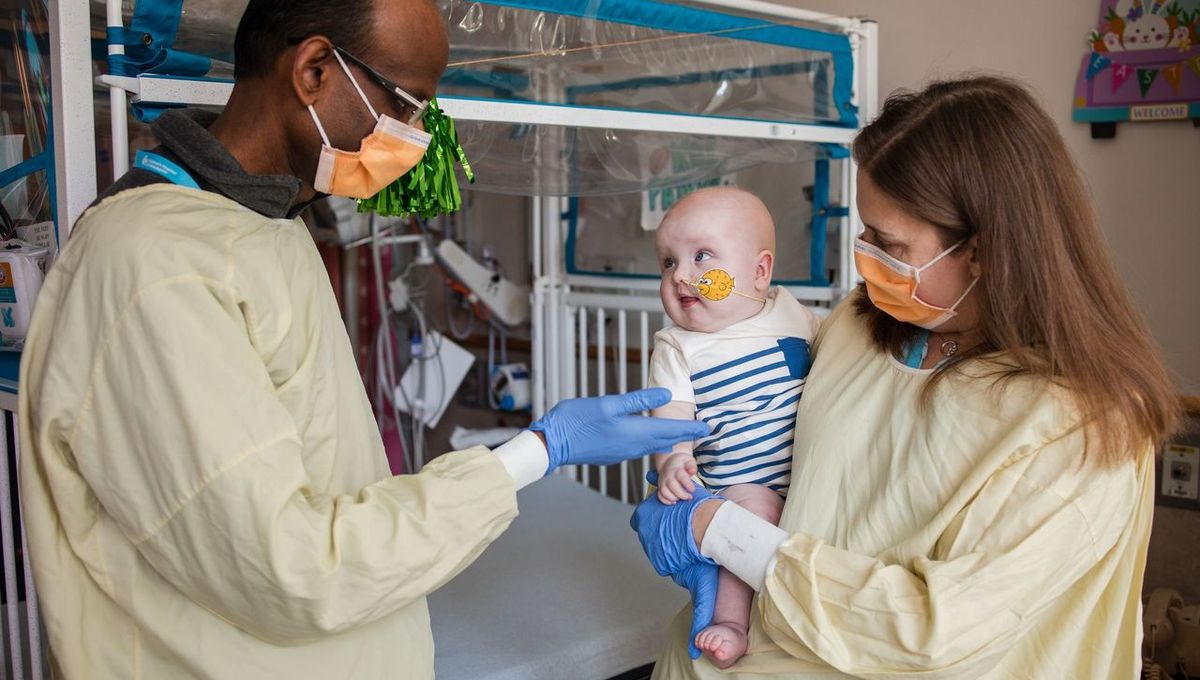
An infant with a life-threatening and incurable genetic disease has become the first human to successfully receive a personalized gene editing therapy. This is a massive achievement and could represent a platform for the rapid development of treatments for other genetic diseases.
The child was diagnosed with carbamoyl phosphate synthetase 1 (CPS1) deficiency shortly after birth. This condition is characterized by an inability to fully break down protein byproducts in the liver.
When we eat excessive amounts of protein, our bodies break down the amino acids we don’t need into toxic ammonia. This ammonia is then converted into urea in our livers, which is harmless and eventually excreted when we pee. However, for people with CPS1 deficiency, one of the enzymes involved in the urea cycle (CPS1, where it gets its name) does not work properly, so the ammonia starts to build up to harmful levels in the blood.
The symptoms for this condition tend to occur soon after birth and include poor feeding, vomiting, lethargy, excessive sleeping, rapid breathing, dehydration, and seizures. Over time, the disorder can become more debilitating, leading to severe neurological issues, developmental delays, liver damage, and even death.
Treatments for the condition include managed diets with low protein intake until the child is able to get a liver transplant. But the waiting lists for these procedures can be long, which runs the risk of rapid organ failure due to stressors from infection, trauma, or dehydration.
However, in this latest case, the child experiencing CPS1 deficiency was treated with a new customized therapy that used the gene-editing platform CRISPR (short for “clustered regularly interspaced short palindromic repeats”). It’s a technology that scientists use to selectively modify the DNA of living organisms. This is the first known case of a personalized CRISPR-based medicine administered to an individual patient. The process was carefully designed to only target non-reproductive cells so changes would only affect the patient.
“As a platform, gene editing – built on reusable components and rapid customization – promises a new era of precision medicine for hundreds of rare diseases, bringing life-changing therapies to patients when timing matters most: early, fast, and tailored to the individual,” Dr Joni L. Rutter, director of NIH’s National Center for Advancing Translational Sciences (NCATS) explained in a statement.
The infant, named KJ, initially received a low dose of the therapy when he was 6 months old but later had a higher dose. Positive results were evident almost from the start. The 6-month-old started taking in more protein in his diet, allowing the care team to lower the medicine needed to manage ammonia levels in his blood.
“We knew the method used to deliver the gene-editing machinery to the baby’s liver cells allowed us to give the treatment repeatedly. That meant we could start with a low dose that we were sure was safe,” Dr Rebecca Ahrens-Nicklas, a CHOP pediatrician added.
Further confirmation that the treatment was working so far came when KJ caught a cold and later a gastrointestinal illness. Normally, these infections would be extremely dangerous to a child with this condition especially with the possibility of ammonia reaching toxic levels in the brain.
“We were very concerned when the baby got sick, but the baby just shrugged the illness off,” Dr Kiran Musunuru, a Penn geneticist and first author of the team’s study explained.
At present, the results of this intervention look promising, but KJ will need ongoing monitoring. If all goes well, then this may be the first example of a new treatment that can be tweaked to treat a wide range of genetic disorders in the future. For now, let’s all keep our fingers crossed for the child and for the science.
The paper is published in The New England Journal of Medicine.
Source Link: Infant Becomes First Human Ever To Receive Personalized CRISPR Gene Therapy Treatment